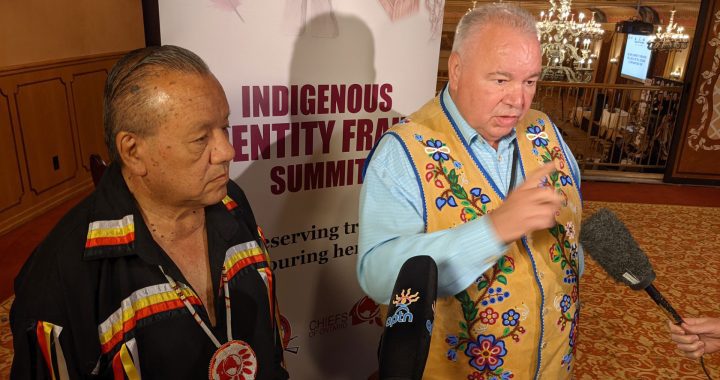
The exterior of the Winnipeg Law Courts building. Photo: APTN file
Lawyers for a man accused of killing four Indigenous women in Winnipeg are challenging the impartiality of the jury chosen last week to hear the evidence against him.
Jeremy Skibicki, 37, has pleaded not guilty to four counts of first-degree murder in connection with the deaths and disappearances of Rebecca Contois, Marcedes Myran, Morgan Harris and an unidentified female victim referred to as Buffalo Woman.
All the women are believed to be Indigenous and were killed weeks apart between the middle of March 2022 and end of May 2022, the Winnipeg Police Service has said.
Police allege the women, ranging in age from 24 to 39, were sexually assaulted before they were murdered and their bodies dumped in residential garbage bins before ultimately ending up in two Winnipeg-area landfills.
Skibicki, a non-Indigenous man, has been in custody since his arrest in May 2022.
Read more:
Man accused of killing four women, disposing of bodies, pleads not guilty
“This morning the courtroom was smudged,” announced Crown attorney Christian Vanderhooft. “Smudging is used to cleanse a room of negative energy.”
The prosecutor said First Nations cultural symbols of tobacco ties – tobacco tied in red cotton to represent prayers – an eagle feather and buffalo headdress would remain in the courtroom throughout the trial.
Defence lawyer Leonard Tailleur of Legal Aid Manitoba is arguing an online poll commissioned by Legal Aid in February shows his client can’t get a fair trial by jury. He made a motion to have the evidence heard by judge alone.
Tailleur first challenged the automatic judge-and-jury trial for first-degree murder through a pre-trial motion late last year. His argument was rejected by Court of King’s Bench Chief Justice Glenn Joyal.
“This week, we will hear a constitutional challenge about the impartiality of the jury,” Joyal told the public gallery nearly a quarter full of news reporters.
Hearing evidence
A nine-woman, three-man jury is scheduled to begin hearing evidence on May 8 in the high-profile trial that may last into June.
Skibicki, dressed in a t-shirt and loose-fitting pants, was led into the courtroom with shackles around his ankles. He was seated in a newer, smaller prisoner’s box flanked by two sheriff’s officers.
For most of the day, the accused kept his head turned towards a big screen to watch expert defence witness Quito Maggi testify virtually about the poll.
“We were commissioned to conduct the survey by Legal Aid Manitoba,” Maggi, president and CEO of Canadian polling company Mainstreet Research, told the court. “We were contacted a week or two before (Feb. 12). We were provided a script about a week before that.”
Maggi said the online poll ran between Feb. 12 and 15 and reached people via their cellphones.
Negative opinion
He said the poll asked respondents if they “have a negative opinion of Jeremy Skibicki” and their take on three criminal defence strategies: “Not criminally responsible due to a mental disorder, problematic DNA evidence, and self defence.”
A relative of one of the victims posted a link to the poll on her Facebook page, court heard.
However, she and other family members weren’t in court Monday. They said in a news release issued by the Assembly of Manitoba Chiefs they would not be doing any media interviews during the trial.
Reporters and others watching the proceedings had to pass through two security checkpoints staffed by Sheriff’s officers.









